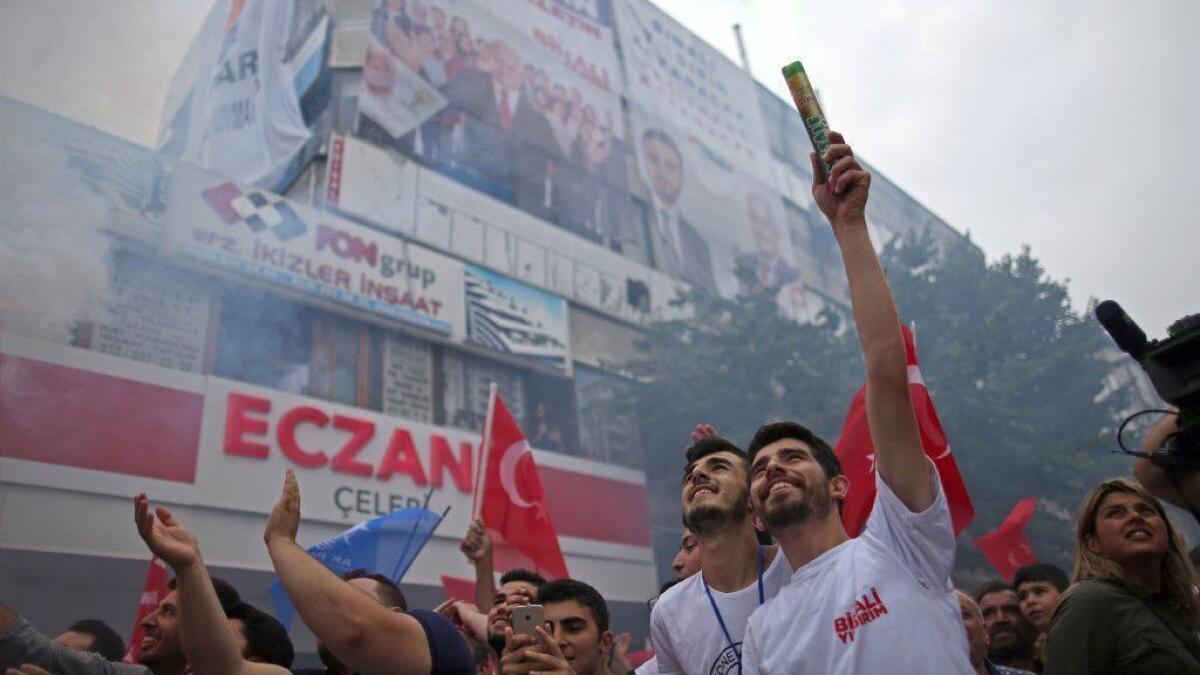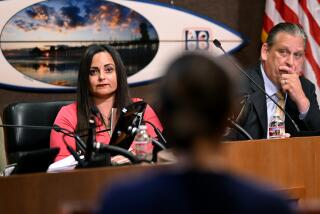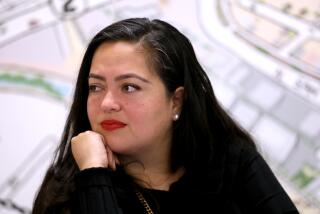Istanbul mayor election do-over is a key test for Turkey’s authoritarian-minded president

It was a sultry early summer evening in the Istanbul neighborhood of Carsamba, a traditional stronghold of Turkey’s ruling party, and the locals were gathered around a big open-air screen, sipping tea and watching a debate between candidates vying to be the city’s next mayor.
And then something odd happened: several times, when the ruling party’s candidate spoke, listeners responded with derisive laughter.
Sunday’s mayoral election, a controversial redo of a vote held 12 weeks ago, is shaping up as the most serious challenge in years to Turkey’s authoritarian-minded President Recep Tayyip Erdogan.
After the ruling party narrowly lost the March 31 municipal vote in Istanbul, the country’s highest electoral board ordered a do-over, acting on what was widely perceived as pressure by Erdogan’s ruling Justice and Development party, or AKP.
If the party loses again, there could be heavy implications for Turkey’s fragile democracy.
Istanbul’s mayoralty is a rich prize. The city is Turkey’s economic powerhouse, generating nearly half of the country’s tax revenue and accounting for 30% of the entire national economy. Erdogan won the mayor’s job 25 years ago, and used it as the springboard for his national political career.
“It’s a very high-stakes game,” Howard Eissenstat, a senior fellow at the Project on Middle East Democracy, said of the Istanbul vote.
Erdogan, he noted, maintains control over Turkey’s basic structures and institutions, but his party’s loss in Istanbul would deprive the president of an important source of patronage — and betray weakness that would likely be exploited by opponents inside and outside his own party.
In Sunday’s vote, the ruling party’s candidate, veteran politician Binali Yildirim, faces off once again against Ekrem Imamoglu, a soft-spoken newcomer to politics. Imamoglu served as mayor for 18 days before the recount was ordered, based on allegations of fraud by the ruling party that many independent observers have deemed specious.
Erdogan, who has often cited the maxim that “if we lose Istanbul, we lose Turkey,” stepped into the fray Thursday to whip up the party’s voting base.
The president claimed the opposition is backed by terrorist groups. A pious Muslim whose following draws heavily upon the devout, Erdogan also charged that a senior local leader of Imamoglu’s secular Republican People’s Party, or CHP, violated Islamic teachings by eating pork.
In Carsamba on the night of the debate earlier this month, dozens of men squatted on plastic stools in the street in front of a tea shop, eyeing the projector-screen spectacle. The AKP is popular in conservative neighborhoods like this one for allowing the revival of traditional dress — turbans for men and the carsaf, or face veil, for women — that Turkey’s founding secular government outlawed.
But even in this Erdogan-friendly district, a series of pledges by Yildirim — including a subsidy of $1,400 for newlyweds and 10 gigabytes of free online data for every household — drew guffaws. “What am I going to do with that internet, and how are you going to pay for it?” asked one man.
Yildirim has spent much of his campaign touting his party’s two-decade development binge in Istanbul, a city of 15 million people. His campaign slogan is emblazoned across billboards all over the city: “We did what we said, and we are doing it again.”
At the debate, Yildirim, a former transportation minister, held up posters showing how Istanbul’s infrastructure had been remade since 1994, when Erdogan became mayor. But Imamoglu flipped such boasts on their head, saying the city was mired in a culture of “extravagance” — code for the vast amounts of patronage doled out by and to party cronies.
Imamoglu got a good look at the books during his short tenure as mayor, and he informed voters that the city is carrying a debt of $4.5 billion, attributing much of the shortfall to overcharges by AKP-linked private utilities and to hundreds of millions of dollars funneled to private foundations run by relatives of Erdogan.
In the debate, Yildirim brushed aside Imamoglu’s numbers as fabricated — but then was forced to admit he had never read the municipal audit report his opponent was citing.
If pocketbook issues take primacy, the AKP has been wounded by Turkey’s mounting economic woes.
Inflation has spiked, with the price of potatoes, onions and other staples tripling in less than a year, and unemployment stands at nearly 13%. That adds to Imamoglu’s appeal even among pious young men who would normally back the AKP.
His campaign deliberately avoided prolonged expressions of anger about the overturning of the original vote result. Its soothing if somewhat anodyne slogan — “Everything will be fine” — stood in sharp contrast to Erdogan’s furious rhetoric, which leans heavily on allegations of dark conspiracies by enemies of the state.
Imamoglu sought to peel devout Muslims away from the AKP by distancing himself from the CHP’s staunchly secular approach. He appeared at mosques for Friday prayers and turned up at family homes for the evening breaking of the fast during Ramadan, which overlapped in part with the campaign.
He also turned to social media — amassing 2.6 million Twitter followers — to circumvent a media landscape that Erdogan has reshaped to give the AKP an electoral edge.
And rather than the big-money resources of the AKP, Imamoglu’s campaign has drawn on grass-roots donations, with at least 550,000 people chipping in a total of nearly $2 million.
“Imamoglu is a very credible candidate, one who can beat the ruling government machine,” said Berk Esen, assistant professor of international relations at Bilkent University. “He has done a superb job of conveying to voters that government spending and corruption is not just a theoretical issue, but that spending comes directly out of the pockets of voters.”
If the Istanbul vote goes Imamoglu’s way, Erdogan may face greater pressure within his own party. The recount decision was criticized by well-known leaders including former president Abdullah Gul and an ex-prime minister, Ahmet Davutoglu. That has given rise to speculation that senior AKP figures might seek to break away and form a new political entity.
But Imamoglu faces risks as well: If he wins, the central government could move to curtail his municipal powers, or even seek to have prosecutors bring charges against him, genuine or not.
The revote comes in the middle of Turkey’s summer vacation season, but many opposition voters who would usually be basking on a beach are planning to return to the city to cast their ballots.
In the Aegean resort town of Datca, where the municipal government is controlled by the CHP, officials made a tongue-in-cheek effort to encourage Imamoglu supporters to head back to Istanbul and vote. They announced a mock election day forecast for the seaside town: rainstorms, sandstorms and snowstorms.
Special correspondent Farooq reported from Istanbul and staff writer King from Washington.
More to Read
Start your day right
Sign up for Essential California for news, features and recommendations from the L.A. Times and beyond in your inbox six days a week.
You may occasionally receive promotional content from the Los Angeles Times.






